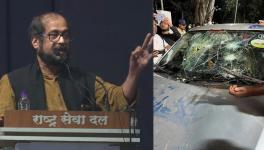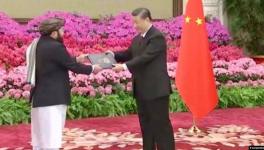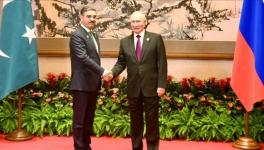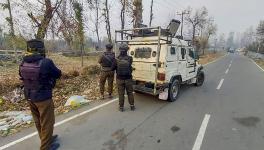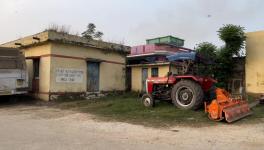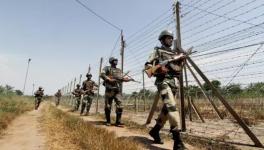India's Surgical Strike: Blurring Lines or Crossing Redlines?
Indian government claimed on Thursday that it had carried out “surgical strikes” on terrorist launch pads in PoK. Sukumar Muralidharan spoke to Maj Gen (retd) S G Vombatkere on the issue. He explains that it was a deliberate offensive strike planned at the higher level and was a well calculated move. Maj Gen Vombatkere also explained what could be military and political outcome of this strike.
Rough Transcript:
Sukumar Muralidharan (Sukumar): This is the evening of Sept.29th and this morning there was a briefing from the Director General of military operations about a Commando operation across the line of control yesterday. Indian troops targeted terrorist launch pads in Pakistan occupied Kashmir and destroyed a number of them. Pakistan has denied this and said there was nothing more than cross border firing and small arms and that two of their personnel were killed. But obviously there has been some variety of escalation in the on- going rhetoric between India and Pakistan. So to discuss this and other matters we have Jammu Sudhir Vombatkare. Jammu Vombatkare what do you gather from all that you have heard about the nature of the operation that was conducted last night by the Indian army?
Maj Gen (retd) S G Vombatkere: I would say that it was a well planned well conducted offensive action against the terrorist launch pads in Pakistan which is about 2or 3 kms. From the Pakistan side of the LOC.
Sukumar: Which sector would these be,is there any such information available ? What was the nature of the target? Who would have been the troops the commandos deployed in these operations?
Maj Gen (retd) Vombatkere: The troops deployed would have been the para-commandos as a special force. Where these strikes were precisely which part of the border of the LOC I am not able to say as I don’t have any inside information and even if I had I wouldn’t reveal it. But whatever is known on the television is what I am telling you about. But somewhere in the Northern Command that’s where the LOC is.
Sukumar: But is there any special point of vulnerability that Indiram has checked out and made an estimate would be the best point for such an ingress?
Maj Gen (retd) Vombatkere:: The points of vulnerability are not re-set assessments. These assessments are continuing and points of vulnerability keep shifting points at which we can have ingress are planned well in advance and these things are known over years months or years.So at the present moment which were the points of vulnerability which were the points where we could get across the LOC without being spotted would have been of recent reconnaissance.
Sukumar: So this involved the infantry troops, special forces probably, no use of aviation assets or mechanized infantry or any such thing?
Maj Gen (retd) Vombatkere: Very unlikely because the ingress into Pakistan is just about 2 or3 kms. It wouldn’t call for any kind of support of helicopters or mechanized infantry.
Sukumar: But it involves the use of night vision devices such as..
Maj Gen (retd) Vombatkere: No I don’t think it requires the use of night vision devices but it’s possible that we had night vision devices but it’s not necessary.
Sukumar: But this is in the nature of a moving target just as we continue to update our assessment of where they are locating their launch pads they too would be moving these around to ensure they don’t offer a fixed target for us to act against. So you think they have picked strategically valuable targets and have achieved something of tactical strategic importance probably?
Maj Gen (retd) Vombatkere: I don’t know about the strategic ,they are not strategic targets they are tactical and they would have been acquired over a period of a few weeks at most.
Sukumar: But these would not be in the nature of durable assets ,they would probably be a tent or shed with a roof on it, not something that cannot be reconstructed at fairly short notice…
Maj Gen (retd) Vombatkere: No the target was not an infrastructural target. The targets were the people who were in the launching pads. The point is that there have been kills on the Pakistan side and many would have run away . They would have escaped in the darkness. We have got to probably have photographic evidence or some other kind of evidence to show that actually there were those kinds of kills.
Sukumar: Yes just about a week back there were reports that the Indian army had intercepted some ten infiltrators and eliminated them. And it later turned out that this was in the nature of a psychological operation as there was no concrete proof or any photographic or other evidence of these targets having been achieved. So this is obviously in a different league? What makes you think so? Just the fact there has been a briefing by the DG of Military Operations puts it in a different league . Does it or….
Maj Gen (retd) Vombatkere:This is the first deliberate strike across the LOC which was not planned at the local level. It was planned at a higher level. Local level actions across the LOC may have been there but they are always local level. The question of photographic or other evidence is something that the Pakistanis will deny. They will say that you cooked up these photographs. They don’t pertain to this particular action. Always denial is possible. They have been denying all along.
Sukumar: But do you think that it serves a tactical purpose for the Indian army to produce the photographic evidence or just the say so of the DG Military Operations is sufficient?
Maj Gen (retd) Vombatkere: I do not know whether the army would publicize those photos in order to show that we have made so many kills because it’s not a question of numbers . The question is that we have made a planned strike an offensive action across the border which Pakistan did not expect. They did not expect this kind of action at all . WE have achieved surprise by doing this.
Sukumar: But when you say they didn’t expect this when the signaling has been fairly eloquent if I could put it that way since the Uri incident when 18 of our soldiers were killed there has been ample signaling both from political leadership from our News Studios particularly and retired Army Personnel that this is the tactic we should have robbed.
Maj Gen (retd) Vombatkere: No this was not the only one. There were many options which were being thrown into the ether by the TV channels that you know all out war strike and including the so called surgical strike. There were many options which were talked about including the Indus water treaty and many other things. So Pakistan may not have expected this particular thing or if they did they wouldn’t know at which point and when.
Sukumar: In the context of the longer running trouble that India and Pakistan have had between themselves over Kashmir how much of an impact, how much of a dent does this make in our psychological or tactical advantage over the other side?
Maj Gen (retd) Vombatkere: I don’t think there is any serious tactical advantage but there is a psychological advantage which we have gained which is that the Pakistan army has thought that the Indian army would never come across the border because we are so much under civilian control. And we never had the political will to do this kind of thing. Now apparently we have got that political will to do it. The last time we saw that kind of political will was probably Prime Minister Lal Bahudar Shastri in 1965 and also in 1971 when Indira Gandhi was Prime Minister. So between’71 and now there has been no political will. In fact when the Pakistanis fired across the border onto Indian positions they would shout across the border saying, “Can you retaliate? What can you do? Go and consult your government in Delhi.”
Sukumar: But a certain degree of autonomy was given to Field Commanders .They could retaliate proportionately. Was that an unwritten kind of guidance from Military Headquarters that the Colonel or Brigadier who is in the field…
Maj Gen (retd) Vombatkere: There has been local response …
Sukumar: But this goes beyond that.This comes from the top of the political hierarchy.Now how do you anticipate this evolving?Is there risk of escalation? Pakistan obviously has denied it now but depending upon how India chooses at the level of media operations, psychological operations to proceed they would feel compelled to respond in one way or another. How would that be ? What is your assessment of that?
Maj Gen (retd) Vombatkere: There is always a risk of escalation. But I think this was a fairly well calculated move because it was unexpected from the Pakistan side.
Sukumar: And what would be their preferred or likely mode of responding to this?
Maj Gen (retd) Vombatkere: It’s a very difficult question because they’ve got many options and we do not know what option they would exercise , at which point in time . So, it’s very difficult to say.
Sukumar: How important is deniability for Pakistan because they have denied involvement in Pathankot, involvement in Uri.They say this is all part of the larger problem of Jammu and Kashmir and that India has to get smart to the political imprudence of military deployment against this…
Maj Gen (retd) Vombatkere: The most recent attack at Uri on Sunday 18th,they said it’s not from Pakistan but India which has staged it in order to put the blame on Pakistan. That’s the kind of approach that they are taking to it that we would shoot our own guys in order to make a case against Pakistan. That’s pretty far fetched and no body is buying that kind of argument.
Sukumar: They use typically two kinds of arguments. One that it’s false flag operations by the Indian Forces to discredit Pakistan, second that it’s a part of the completely independent autonomous movement political struggle as they call it in Jammu and Kashmir. They use two of these which points to two kinds of tactics that they deploy one is activating their assets , militant assets within Jammu and Kashmir the other is to step up the infiltration from across the border .There are two possible responses. Is there a substantial difference as to how India should prepare for either of these?
Maj Gen (retd) Vombatkere: The attack at Uri where they cut through the fencing and came and used incendiary weapons to burn those tents is not something which the local Kashmiri Azadi demanders could have done because it requires military training . You can’t just do that without training and obviously they have been trained by Pakistan and they could not have been trained by Pakistan with in Kashmir. So its obviously on the other side of the LoC that they have received training. So there are launch pads, there are training camps, which are known to the whole world and which have been consistently denied by Pakistan.
Sukumar: There’s been a lot of talk especially since the Uri incident about crossing the nuclear thresh hold and Pakistan has at least claimed to have tactical nuclear weapons. Now India has made it clear that it will not use tactical nuclear weapons or develop them because any nuclear use means that the thresh hold is crossed and all options are on the table after that. So there’s a lot of loose talk about this. People talk very flippantly about this option. If there is an existential threat to Pakistan you see the threat of escalation beyond that …
Maj Gen (retd) Vombatkere: The Pakistan threat of use of tactical nuclear weapons is clearly that if India crosses the border then we will use tactical nuclear weapon on the Indian troops who have crossed the border or the LoC which means that the tactical nuclear weapon will be used on what is claimed as Pakistani territory so that should not call for a no first use response from India because it would still be no first use.
Sukumar: So that means from India’s point of view the thresh hold is crossed even if it is on Pakistan territory…
Maj Gen (retd) Vombatkere: It depends on how it is interpreted.
Sukumar: What is the signaling from the other side because there is obviously a doctrine in place
Maj Gen (retd) Vombatkere: I do not know whether there is a national doctrine in place but the point is I also do not know whether we have tactical nuclear weapons. We do have…
Sukumar: The claim is that we don’t, the official one.
Maj Gen (retd) Vombatkere: We could assume that that is true in which case nuclear weapon used by India would be a strategic nuclear weapon and for that we have said no first use .
Sukumar: Finally what do you think would be the military first and second diplomatic fallout of these in terms of the larger players in the scenario?
Maj Gen (retd) Vombatkere: I am pretty sure that China does not want a nuclear conflagration anywhere leave alone in South Asia and I don’t think any other country wants. There could be irresponsible people in Pakistan who would get control of nuclear weapons . That is not the government and not the Pak army. I don’t think the Pak army either is interested in this kind of thing. There is nobody who is really interested in nuclear exchange. But ISIS or some other fundamentalist group could get control and that would be a disaster.
Sukumar: And what would the reaction of the United States be? They just had a meeting with Mr. Nawaz Sharif, John Kerry just a week back in New York and the tone of that meeting by all accounts was fairly cordial and Pakistan is still a valuable friendly partner for the United States.
Maj Gen (retd) Vombatkere: That is the story that the USA is calling for restraint from both sides that is India and Pakistan.That the meeting between Kerry and Nawaz Sharif was cordial is not surprising. It would be cordial. There is no reason for them to not meet him or refuse to discuss . I think it is very much in the interest of the USA that there is no escalation of conventional warfare or of nuclear warfare in this area.
Sukumar: Thanks so much General Vombatkare. That has been an interesting discussion. Lets follow further developments very closely. Thank you.
DISCLAIMER: Please note that transcripts for Newsclick are typed from a recording of the program. Newsclick cannot guarantee their complete accuracy.
Get the latest reports & analysis with people's perspective on Protests, movements & deep analytical videos, discussions of the current affairs in your Telegram app. Subscribe to NewsClick's Telegram channel & get Real-Time updates on stories, as they get published on our website.









